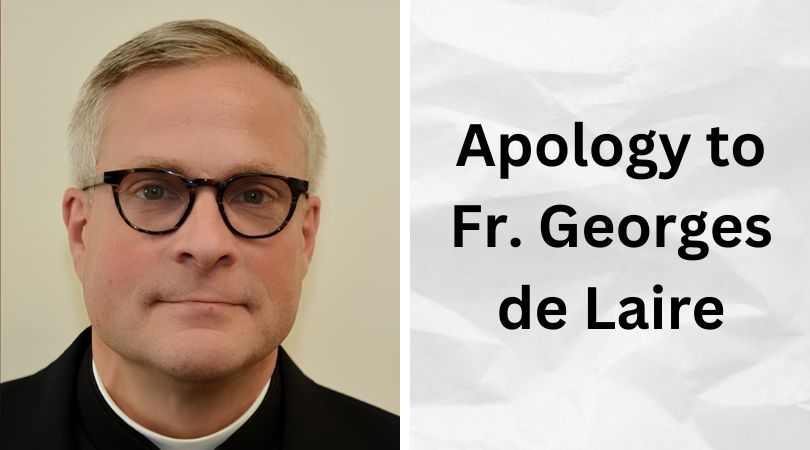BIAŁYSTOK, Poland (ChurchMilitant.com) – A top Polish charity worker and theologian has submitted an “act of apostasy” and announced that he is leaving Catholicism to escape from “heinous crimes” like “abuse of minors and the pretense that it does not exist in the church.”
Abp. Józef Guzdek
Slamming the institutional Church as a “mafia” guilty of “sheltering criminals,” Sebastian Wiśniewski, deputy director of Caritas in Białystok, said the decision was “the result of years of work and observations in Caritas and almost 50 years as a Catholic.”
“I cannot be a member of an organization that, to some extent, shelters criminals,” the charity boss stated, describing the Church as a “mafia corporation that abuses the sign of the cross.”
Formal Apostasy
Wiśniewski, who has converted to the Baptist denomination, joins a tidal wave of Poles formally quitting the Catholic Church by formally submitting an “act of apostasy” — regulated by a 2016 decree of the Polish Episcopal Conference on withdrawal from the Church.
The declaration must include the date of baptism and categorically state the will to leave the Church as a voluntary act. It must also explain the reasons for the apostasy and must be presented to the parish priest in person.
The parish priest who accepts the declaration is obliged to try to convince the apostate in spe (in hope) to abandon his or her intention and inform the person of the consequences of excommunication.
The parish priest makes a note on the baptism certificate that a declaration of leaving the Church has been made but is prohibited by canon law from issuing a certificate of “leaving the church.”
Archbishop of Białystok, Józef Guzdek, who oversees Caritas in his archdiocese, reacted very negatively to the news of the apostasy, and the parish priest even tried to threaten him, Wiśniewski revealed.
“He started by saying that I was crazy, what I thought, what people would think about me. He changed his tone from attempted threats and clumsy lectures to a gentler tone,” the charity worker said.
Later, the parish priest said that he had heard from the bishop that he could “not be buried and there would be no priest at the funeral.” The bishop also gave him two weeks to “come to his senses and change his mind,” Wiśniewski reported.
In interviews with media outlets last week, Wiśniewski accused Caritas of deriving “joy from natural disasters and other events that improve the Caritas budget through financial proceeds from fundraising.”
The charity boss said that he had observed how the “clergy [live] comfortable lives at the expense of naive believers,” with “priests accumulating wealth contrary to what the Bible, especially the New Testament, teaches.”
All this led him to “the realization that this church is not a path to holiness, but a corporation — at its worst — taking care of its own capital” while “hiding deviants [priests guilty of sex abuse] within parishes or sending them to other dioceses,” Wiśniewski noted.
Conversion to Protestantism
The charity head elaborated:
In the Baptist Church I am a free person, and morality, relationships and life are based on the Bible. In the Catholic Church, I was constantly subjected to impersonal evaluation. The burden of commandments, orders, prohibitions, you must do this and that, and if you don’t, you will be cursed, anathema, you will end up in hell, when they do what they want and how they want.
“By consciously being baptized in the Third Polish Baptist Church ‘Community of Good Hope’ in Białystok, I feel closer to God and have a deeper relationship with God,” he added.
Fr. Tomasz Adamczyk
The straw that broke the camel’s back for him was the detection of irregularities in the functioning of Caritas in Białystok at the turn of 2022 and 2023, Wiśniewski explained.
Wiśniewski went on to attack the hierarchy’s “monarchist way of management” with the pope playing the role of “Caesar,” bishops acting as “governors” and “rank-and-file” playing the role of “executors of orders.”
“I often asked parish priests how many poor people there were in their parishes. Ninety percent of them were unable to answer this question. They always knew how many donors and wealthy people there are,” he lamented.
“Money is constantly being collected, but no one knows for whom, because no one knows how many people are in need and no one knows their real needs,” he said.
“It was good in the Middle Ages, but it’s gone now. The Catholic Church is so effective, that many people are leaving the faith and God,” Wiśniewski observed.
Church in Crisis
In October, Polish sociologist Fr. Tomasz Adamczyk from the Catholic University of Lublin confirmed that the recent exodus of Poles from the Catholic Church is “the biggest crisis since 1989.”
“Cardinal Grzegorz Ryś recently said at the grave of John Paul II that the Church was in ruins,” Fr. Adamczyk admitted. “I think the word ‘crisis’ can be used to describe the situation of the institutional church in Poland.”
“This is undoubtedly the biggest crisis since 1989. This is confirmed by numerous studies,” the sociologist observed. ” The process of secularization in the West has been going on for many years, and Poland is no exception.”
“I remember that some people thought that our country was some kind of phenomenon on the map of religiosity, but it turned out to be completely the opposite,” Fr. Adamczyk lamented.
Sebastian Wiśniewski
According to a November study published by ONET, there are already dioceses in the country where less than 1 in 5 faithful attend mass. In some counties, almost half of weddings are civil marriages held without any religious service.
The study shows that 59% of Polish Catholics believe that the Church is in a crisis, and 53% of respondents cite clerical sex abuse scandals as the reason for leaving the Church.
Seventy percent of Catholics insisted on greater financial transparency and called for the abolition of tax privileges for the Church.
Only 28% of respondents declared that the teachings of the Church were attractive to them, as significant numbers of Catholics are converting to evangelical and Pentecostal Protestantism.
“I think there is no other way to stop negative trends than the conversion of the Church,” noted Fr. Przemysław Podlejski from the Pallottine religious order.
“When I say ‘Church,’ I mean believers, both lay people and clergy. It’s about personal conversion and living the Gospel every day,” Fr. Podlejski emphasized.















